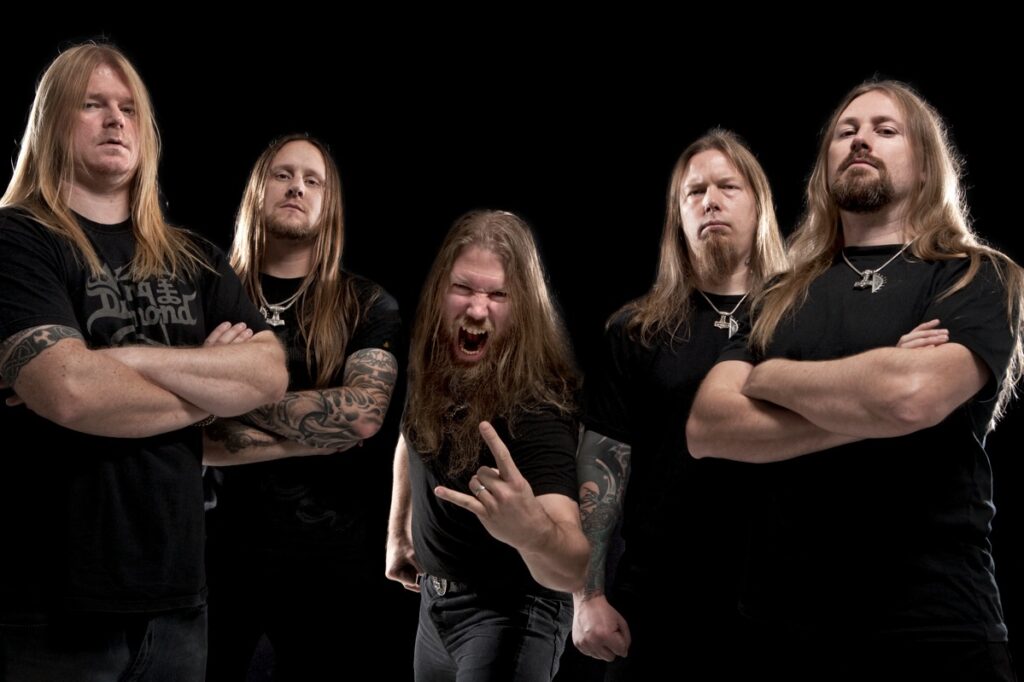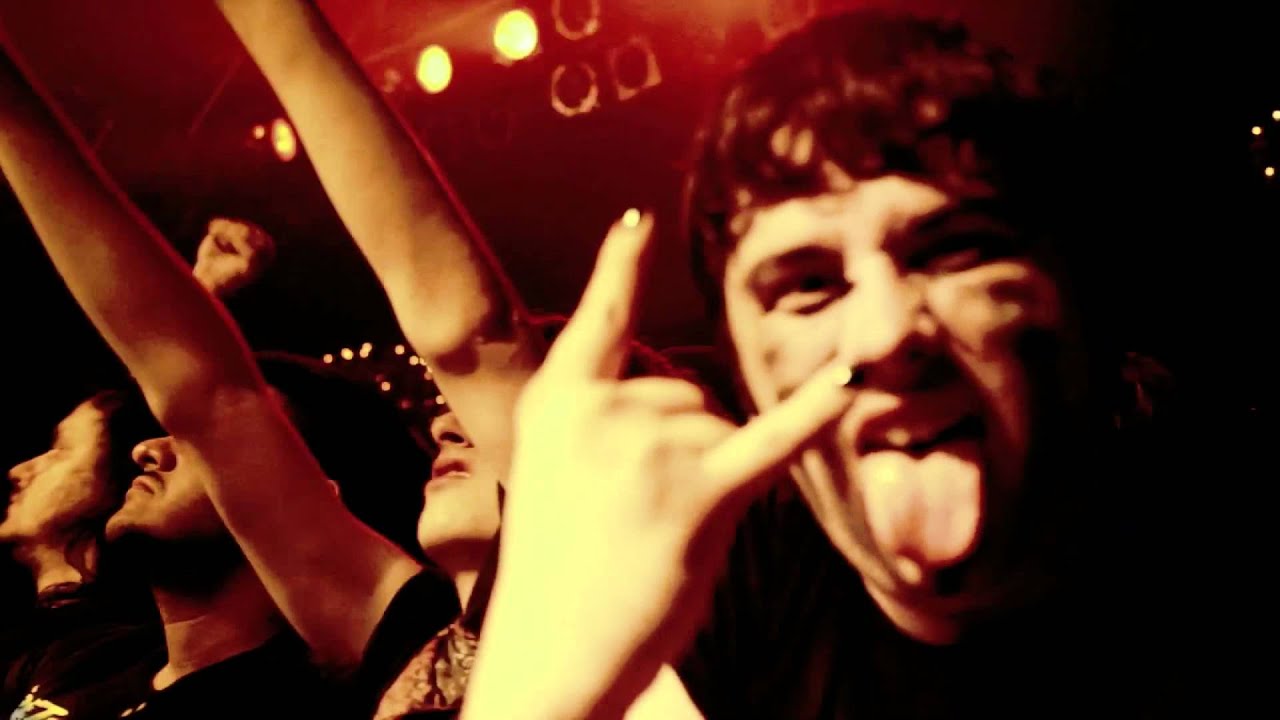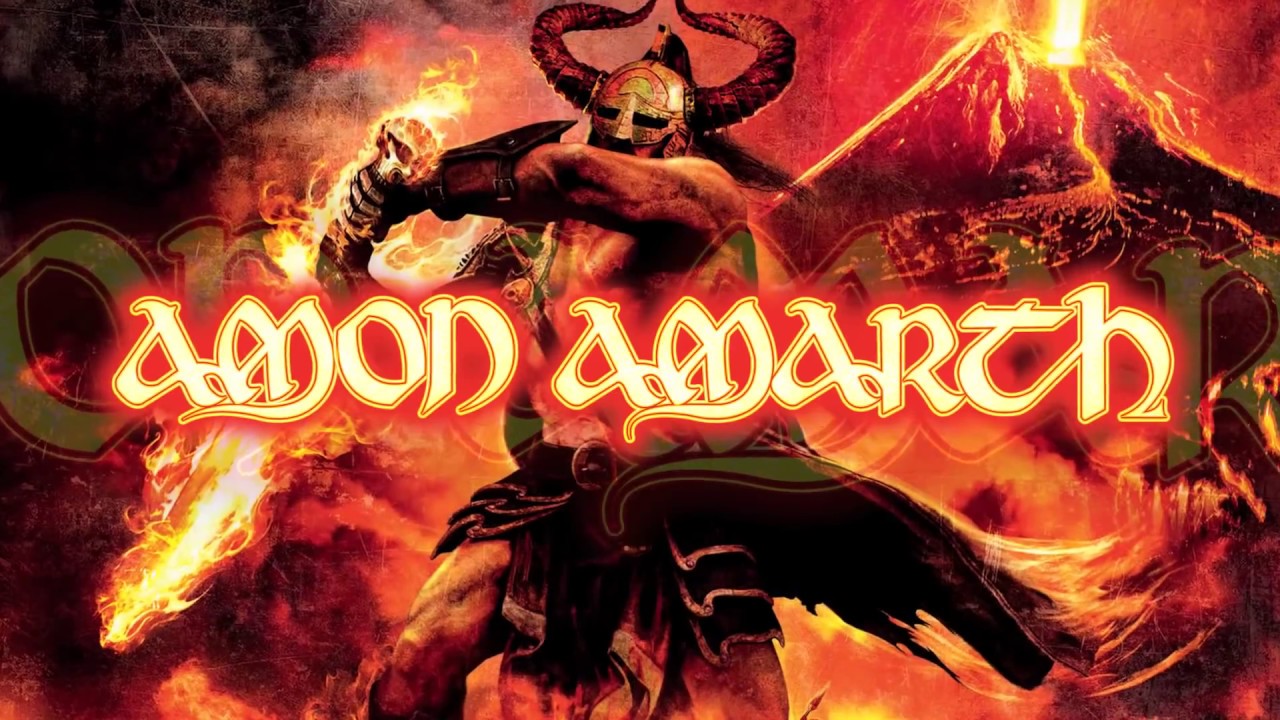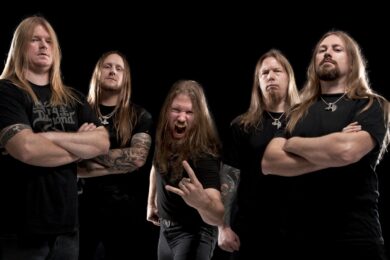Underground veterans done good, Amon Amarth are one of extreme metal’s success stories, flying the flag for Real Metal Values while a tide of seemingly flash in the pan movements such as deathcore invades the genre like a particularly nasty virus. Formed in the late 80s as a grindcore act by the name of Scum, the band converted to their Lord of the Rings-derived moniker (basically ‘Mount Doom’ in Elvish) in the early 90s, adopting a more death metal orientated sound in the process, as well as the Viking-inspired lyrical themes that have become the band’s trademark. Displaying an impressive work ethic, the band forged no less than five albums and an EP before 2006’s With Oden By Our Side provided a surprise breakthrough, selling 100,000 copies worldwide and proving that perseverance and a stubborn refusal to conform to prevailing trends can transform strong grass roots support into wider acclaim.
2008’s Twilight Of The Thunder God saw the band continue their ascent, accompanied as it was by numerous cover stories and tours with metal royalty such as Slayer. And now the band’s eighth album, Surtur Rising, looks set to maintain the Swedish stalwarts’ success. Blending their fist-pumpingly epic Iron Maiden-meets-Bolt Thrower harmonised riffing with Johan Hegg’s fearsome-yet-decipherable growl, this is a record that – in the fine tradition of the band’s heroes Motörhead – offers few surprises, but instead attempts to expand and improve on a familar template. For that reason it comes as something of a surprise to learn that the outfit’s longtime songwriter and founding member Olavi Mikkonen has taken something of a backseat this time around, as he explains when we meet with him and vocalist and Thor-lookalike Johan Hegg.
"I had a ‘writing block’ or whatever you call it, so I started to write quite late," laughs the jovial axeman. "Luckily Johan [Söderberg, the band’s second guitarist, who, like drummer Fredrik Andersson, joined the band in 1998] had many more ideas this time. I think Twilight… was written maybe 70% by me, and Versus… was like 98% me, but now it’s more or less 50/50 between me and Johan, with Fred also contributing with one song. I guess the fans probably won’t really hear that so much because in the end it doesn’t really matter who writes the riffs or the music, in the end we still sound like Amon Amarth because we arrange it together."
So do you tend to write everything individually, then bring it to the rehearsal room and start to arrange it as a band?
Olavi Mikkonen: We bring maybe an idea – like a couple of riffs, a bridge and maybe a chorus – and then we start together with that in the rehearsal place and you know, a lot of demos… at every rehearsal we make a demo then we all go home and the next day we make changes. So it’s not like one guy is writing everything at home and presenting complete songs, we always arrange the songs together and we also rehearse the songs together because we still want to be a rehearsing band.
Are you still located near one another?
OM: Yeah. I mean, Johan [Hegg], he’s now living in a completely different city, but except for him we all live pretty near each other. We all are from different areas of Stockholm so we rehearse kinda central.
Johan Hegg: I used to have two rules: number one was that I wouldn’t get married and number two was that I wouldn’t leave Stockholm, and I broke both of those rules this year.
So congratulations are in order… Having seen you running riot in a church for a Metal Hammer photo shoot I’m assuming that this was not a traditional wedding?
JH: No, no. It was a medieval, Viking-style wedding. It was fantastic, everyone dressing up, great food, and great weather, as it was an outdoor wedding. My wife had a really beautiful but simple gown, kind of inspired by Lord of the Rings, a bit like, I forget her name, you know the girl who is with the horse people? I had a Viking outfit inspired by the Varyags of Miklagaard.
Who of course inspired your song of the same name…
JH: Yes! They were the Vikings who travelled the rivers of Russia down to Istanbul and became employed in the service of the Emperor. They were his personal guard because they were very trustworthy and fierce warriors and they would dress very elaborately with baggy pants and ornate coats.
So has your move made it harder to rehearse regularly?
JH: I’m a little bit further out now – about two hours drive – from the rehearsal rooms, but we mainly go there when we’re going to go on tour or when we’re writing and then I would go and stay for a few days then go back home.
OM: I mean, when we have a writing session for a new album, then we rehearse every day from like 10am to 3pm or something like that. When people go to their ordinary work, we go the rehearsal room, and then if we don’t have any more ideas, we’re like, ‘Hey let’s have a break for like a week, then, when we have some more ideas, we get back here.’
So has the success of the band changed things a lot for you in the sense that you can now devote so much more of your time to the band?
OM: We have so much time to write songs now since we don’t do anything else other than playing in Amon Amarth. We have much more time now then when we had day jobs and we had to rehearse in the evening. Now if we rehearse for one month it’s more hours than normal bands that maybe rehearse like twice a week or whatever.
So going back to the writing process, did it worry you when you found you had this writing block?
OM: No, it comes and goes all the time, but usually I already have ideas before we start writing together, I have ideas that I have gathered at home. You know, whenever this touring cycle is over, it’s time to start presenting new stuff. And this time I didn’t have anything, I was totally empty. Luckily, Johan had ideas. My ideas more or less came during the summer and that’s when we were close to actually recording, so it was kinda too late already, because we already had such a great album, we didn’t need them. But now I actually have some songs already ready for the next album.
JH: As long as the material that comes out sounds good, and we feel we can all work with it, it doesn’t matter who wrote it. Anybody who contributes something that sounds good and is interesting is welcome to contribute. We would be stupid otherwise. We’ve never been rigid with that, it’s just that we’ve always had a very high standard.
But I think Johan and the others have become more comfortable with writing stuff that suits our sound over time, because the stuff that he would come up with in the beginning wasn’t always stuff that fitted our band, but the songs he writes now could fit any Amon Amarth album. So I think he grew into it, really. The more songs he produces that makes it on the album, the more confident he gets, which we are all very happy with as it gives us more opportunity to create more stuff.
Given that you were leaving much of the songwriting in new hands, did you have a lot of discussions about the directions you wanted the album to take?
OM: No, we didn’t really. Sure, we wanted to make it a little darker and maybe a little more brutal than Twilight…, because the album is about a brutal fire god, but we don’t talk much about direction or anything like that. It’s like whatever comes up that works, you can’t really plan these things.
The fire god in question is none other than the Surtur of the album title, a formidable character in Viking mythology who eventually destroys the world with fire at Ragnarok, a time when every god seems pitted against another in a sort of otherworldly royal rumble. In the case of Surtur, Johan explains, it falls upon a fertility god named Frej, who is forced to fight the fire god with nothing more than a lowly dear horn, having traded his sword to marry the woman he loves. The battle is something of a central theme for the album, with two songs devoted to the face-off, ‘Destroyer Of The Universe’ and ‘The Last Stand Of Frej’, written from Surtur and Frej’s perspective respectively. While Johan admits that Amon Amarth are tied somewhat to the Viking concept, he consciously used the subject to explore more universal themes in songs such as closing number ‘Doom Over Dead Man’, in which sweeping strings bring an apt sense of foreboding to the lyrics.
OM: That song is like an old saying of how you should live your life. It’s more or less about this guy who is about to die and all the gold and richness that he’s got, but nobody is going to remember him and he won’t need his riches anyway when he’s dead, so everything he did in his life is useless. Which is still true today.
JH: The song ‘Slaves Of Fear’ came out of a discussion on religion and man’s free will. I think free will is what makes us human and can make the world a better place for everyone, but free will goes hand in hand with free thinking and free thinking in religion is not a big thing.
Do you see the northern mythology of the Vikings as a religion though?
JH: Not really, no. I’m sure a lot of people do, but I prefer to see it more as a philosophy. I’m a confirmed atheist. Well, convinced is the word I guess, but these myths still inspire and appeal to me. As a religion it would be a lot better than Christianity or Islam or something like that – at least that’s my point of view.
You’ve stuck very much to your guns throughout your career lyrically but also musically. There are few bands who can genuinely be described as heavy who also manage to be so uplifting and whose tunes are so, well, hummable. What have been your main inspirations?
OM: I would say traditional heavy metal, combined with the heaviness of Bolt Thrower, some Death and Slayer. I would say it’s a mix of all that and I think it’s the same now as it was 20 years ago. But of course we were there when At The Gates came, the album Slaughter Of The Soul was a big thing for everyone in Sweden. Then ten years ago I heard Rammstein for the first time and thought that was pretty cool. But I would say the foundation is still traditional heavy metal and old school death metal together.
Especially in recent years, many of your songs have felt like classic NWOBHM numbers, except with the addition of death metal vocals and a more ballsy production…
OM: You’re definitely right, in the last five or six years we definitely do more traditional heavy metal riffing than traditional death metal riffing. We don’t really reflect much on it, is just is what it is. But I guess since we were all teenagers in the eighties and listened to traditional heavy metal it’s in the back of our heads.
With the last album being such a success, was there ever a temptation – or perhaps suggestion from outside the band – to maybe make the music more accessible in order to further expand your audience?
OM: We would never change style or anything like that just to get more famous, or try to be commercial or on the radio or whatever. Personally I would like to maybe make an even more brutal album next time, but that is something time will have to tell. But if I was trying to play music for the sake of money I would definitely not play this type of music. The way we see it, we are fortunate that we can do what we do and still make a living. You cannot be honest with your art and write honestly if you do not really believe in the music yourself. And if you’re not writing music that you yourself believe in, how can you convince the fans?
JH: Obviously we’ve evolved but we don’t want to ever really change. We get better at our instruments and at arranging songs to make them more interesting, but I think it’s important for us to know who we are and it seems that fans enjoy that and like the fact that they know what they get with an Amon Amarth album. Of course every so often we get accused of being boring or something, but I think it’s worse when bands you love change too much and you don’t recognise them at all. So for me it’s mainly important that we like what we do.
OM: We don’t really aim too much to make each album different, but of course we try to add some fresh elements. For us the most important thing is to be as much Amon Amarth as possible!
You have an admirable sense of ethics and a disinterest in commercial success which has really shone through during your career, and makes your current popularity all the more impressive. However, as you’ve said this is now a full time occupation for you – where do you see the band going from here career wise? You all have family now, a career in music and a stable kind of life in that sense, do you have to look at it Amon Amarth as a job to some extent at least?
OM: You have to have a steady income for sure, otherwise you have to sell your house or whatever. But I don’t think we will ever… the way we are today, we will never trade that for more money. Whatever we make now is enough. We don’t need more. And if something happens and we can’t make a living from the music, then we just have to step back and take regular jobs again. It’s not worse to have a regular job than to play music you don’t like, or that is not from your heart. Then I can go to McDonalds and cook burgers, it would be the same thing.
Similarly, you’ve remained very hands on with the band, in a DIY fashion that is quite unusual within the metal scene, is that important to you?
OM: Yeah, for me it is. I’m the manager within the band, so I deal with our management and the record label and crew and all that. For me it is like a full time job just to answer emails, especially now when there is an album release, but I’m happy to be having a situation like this. It’s a big machine and everybody in the band has their own positions, what they are doing as well as the music. So Johan [Hegg], he’s the face, doing most of the interviews and the frontman thing. Frederic is doing all the internet stuff – Facebook and all that shit that I don’t even know what it is – and Johan our guitarist, he is the engineer, doing all the demos, he’s the sound engineer, he does all the production when we do the demos all that. And Ted [Lundström, bass] has an eye for cover artwork, shirt designs and stuff like that. It’s gotta be like this.
JH: Everything has been gradual and we kinda learned along the way. We’ve been doing this 19 years, and perhaps 15 without the management, so we learned quite a lot early on. Of course we’ve made mistakes, but we learned so much and we want to be in control, because we want to know what is happening with all the artwork for designs and inlays and so on.
We want to be in total control and not compromise so much. And since we want that, we are probably a hassle, because we always want the last word. Because otherwise somebody releases a shirt with some wrong sign or with runes that don’t say anything or whatever. We don’t want that. If you’re going to use rune writing then it should actually say something, not just be some random runes, but that would definitely happen if we were not in control. So everything you see around the band, you know we’ve had the last word and it’s our wish.
Amon Amarth are currently playing festivals around the world, before touring Canada and the United States. They bring the Nordic rock to the London Forum in October, and you can buy tickets here





